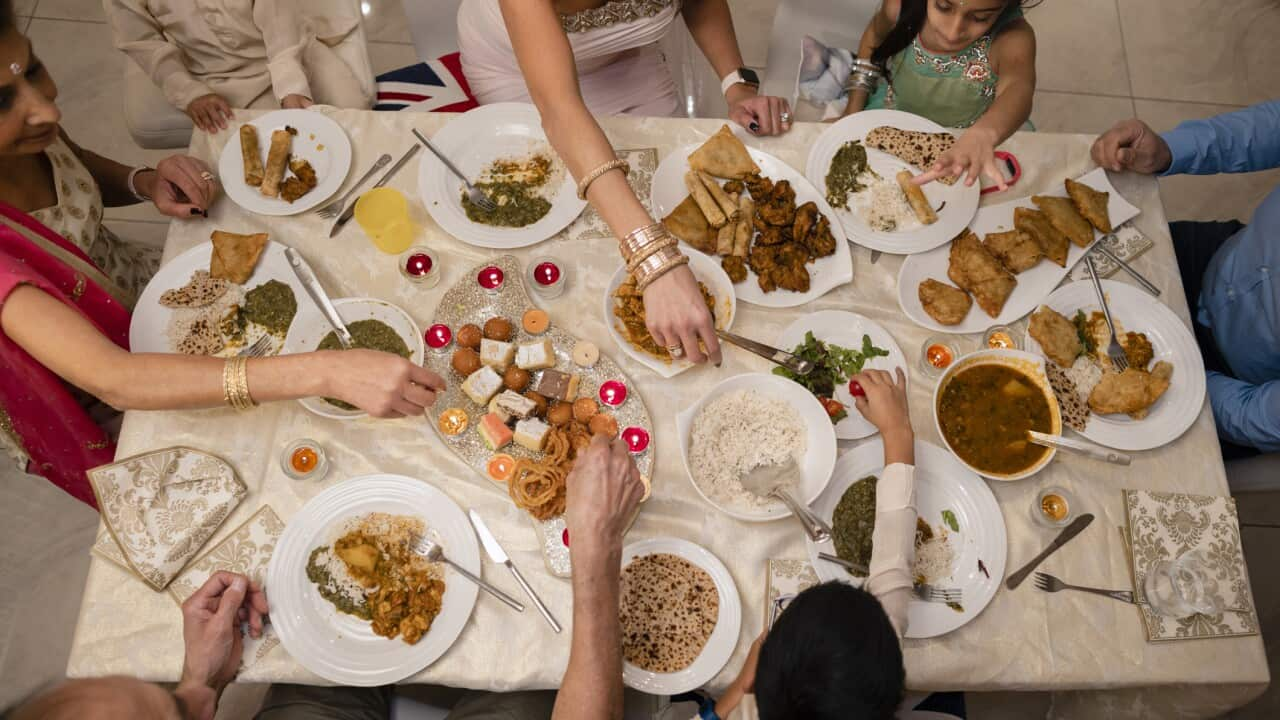Stream free On Demand

Ep 1
episode • Donal's Feasts, Fasts And Festivals • cooking • 49m
PG
episode • Donal's Feasts, Fasts And Festivals • cooking • 49m
PG
It’s one of my first sensory encounters, the scent of rosewater and cardamom, the magic of piercing milk curd to retrieve the syrup inside. In the days before Diwali, the sky crackled with fireworks in Mumbai, where I grew up. My grandmother filled her apartment with diyas, flickering oil lamps laid out so that the Goddess Lakshmi would visit.
But what I remember, most, is the an iconic Bengali sweet, served in silver bowls for family and neighbours and visitors… made of chickpea flour… and vats of shrikhand, a thick, golden dessert made of yoghurt and saffron. The flavours of the procession of dishes that accompany the great Indian celebrations and the people with which you gather to eat them, are seared into my memory.

Credit: Jupiterimages/Getty Images
Especially during festivals such as which celebrates the triumph of light over darkness, dishes often feel like talismans.
Traditional Diwali foods from around the country
– or sweets – are synonymous with Diwali. Various iterations of (a fudge-like milk-based sweet) and , deep-fried balls spun out of cottage-cheese dough and stuffed with pistachio and almonds, are just some of the sweets that have traversed state borders to become everyone’s own.
Take my grandmother’s rasgulla. This sweet originated in the east of the country, where Diwali per se takes on an almost secondary role to Kali Puja, the celebration of Kali, the goddess of creation and destruction, who is worshipped on the day of the new moon in states like West Bengal, Odisha and Assam. It occurs around the same time as Diwali – give or take a day – but the rituals vary.

An idol of Kali, the Goddess of power and destruction, being prepared ahead of Kali Puja, which is celebrated parallelly with Diwali in eastern India. Source: NurPhoto / Getty Images
In northern states like Punjab, where dairy plays a starring role in cooking, Diwali feasts can include dal makhani, black lentils slow cooked with ghee and butter and doodhi ka halwa, a sweet made from bottle gourd and ghee.
To the west of the country, in states like Rajasthan and Gujarat, where the cuisine has been shaped over generations by the region’s royal heritage and arid climate, any line-up of foods in Diwali means mawa kachori. The crisp, deep-fried dessert, stuffed with dried fruits and nuts inevitably appears during this time of year, alongside , a mithai made from roasted gram flour and a much-loved almond sweet called

Dal Bati Choorma is a traditional dish from Rajasthan, India. Credit: The India Today Group/Getty
Festivals, of course, but also weddings, which in many Indian states, typically unfold during and after Diwali, from October to March.
At a friend’s recent nuptials in Tamil Nadu, we gathered around communal tables to eat spiked with tamarind, served on a banana leaf, a gesture of respect that also doubles as a symbol of love and fertility.
Bridging cultures with food and festivity
Diwali is one of those occasions that effortlessly bridges the distinct cultures and traditions that shape the country’s north and south.
Acclaimed South Indian chef and food historian has long believed that during festivals such as Diwali, food takes on a bigger cultural significance. It helps transcend borders, and allows different communities to commune with each other.
He says the feasting that is central to these occasions reinforces the importance of community. “Back in the day, there were families who would move from their ancestral hometown or village to another city but would make a point to come back for Deepavali,” Raghunathan tells SBS. “It would usually be one congregation, however rich or poor they are. I grew up in a joint family where people were scattered all over but for Deepavali, everybody will come together.”
Raghunathan counts vellaiyappam among his favourite Diwali dishes. “It is basically a rice and a urad dal-based fried golden wonder,” he says. “The batter made is very similar to a dosai or an It is then poured in hot oil and it puffs up like pooris.”
During festivals such as Diwali, food takes on a bigger cultural significance.
Just like my grandmother, who is from western India, but loved serving the Bengali rasgulla alongside Diwali dishes common in Maharashtra and Karnataka such as poha (savoury flattened rice), Raghunathan’s Diwali feasts too incorporate pulao and korma - introduced by his aunt and uncle who used to live in Delhi.
According to Raghunathan, the great Indian celebrations transcend borders, and allow different communities to commune with each other.
And when Indians of different backgrounds and faiths marry, Diwali can offer them the chance to be part of the collective magic of the festival, while honouring the distinct culinary lineages they grew up with.
“India is vast with many different languages, religions and traditions,” he says. “Food is central to many social rituals, whether it is a wedding or religious festival. When you share food, it allows people from different backgrounds to come together and appreciate each other’s culinary heritage as well.”
Stream free On Demand

Four Years Later



